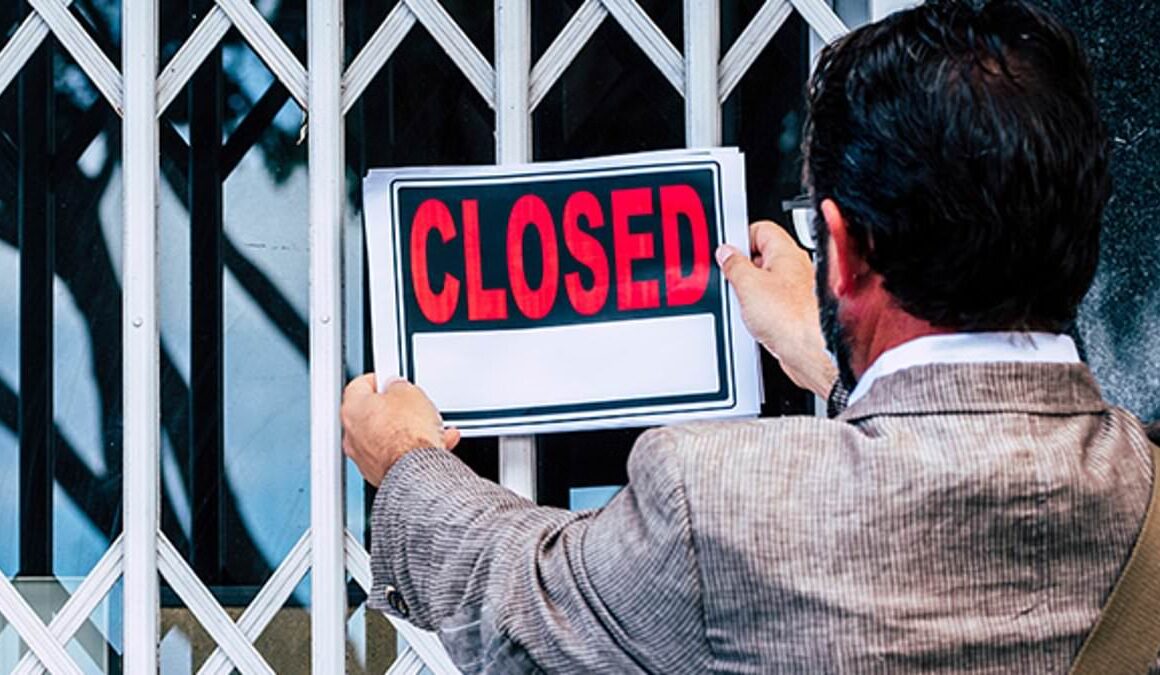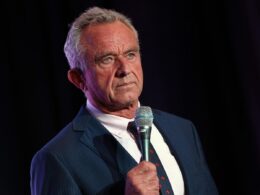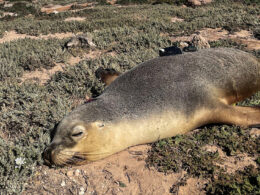Beautician Giulia Teaupa says she almost closed her business as the most aggressive interest rate hikes in a generation came close to crippling her financially.
And she’s one of the lucky ones: a record number of other businesses did go under during the last financial year – simply because customers weren’t able to spend.
This nationwide business collapse is a worrying sign Australia could be heading into a jobs apocalypse unless the situation improves.
Ms Teaupa, who runs Beautician Australia in the Sydney suburb of Miranda, had a cashflow problem as customers, suffering from a cost-of-living crisis, put off having procedures like an eyebrow tint.
‘It was just very stressful. It was very stressful and not knowing how long this period was going to last,’ she told Daily Mail Australia.
The 39-year-old married mother of two, who employs three staff, was close to shutting down her business in late 2022, after six years, as revenue plunged.
‘We’ve had Covid, I’ve had babies in between, we’ve gone through the wringer,’ she said.
‘There actually have been moments where I thought it might be better just to close the business, because definitely as a business owner, you do question sometimes, is it worth it?’

Giulia Teaupa, who runs Beautician Australia in the Sydney suburb of Miranda, was very close to insolvency as higher interest rates meant she had fewer customers
But she was fortunate, having managed to stave off insolvency despite more than 11,000 businesses going bust during the last financial year – the highest number on record.
Ms Teaupa said it was a close call, having struggled to pay the rent on her shop in Sydney’s Sutherland Shire.
‘Those interest rate hikes added a lot of pressure to our business as they changed the spending patterns of our customers, which affected our weekly revenue, worrying about paying bills and rent, strained our finances, and eventually crippled our cashflow,’ she said.
‘When it’s an organic pit, it’s very scary, because you just don’t know when you’re going to come back up, or if you will come back up.
‘That’s actually where the majority of businesses close.
‘And I’ve definitely crossed my mind at a couple of points where I thought, “Oh gosh, is this it now?”‘
In 2023-24, 11,049 businesses went into external administration.
This represents a frightening milestone: it’s the highest number of business failures since the Australian Securities and Investments Commission began collecting and publishing insolvency data in 1999.
Shadow treasurer Angus Taylor said home-grown inflation and multi-employer bargaining were to blame for the insolvency crisis.
‘Small businesses are suffering because of soaring energy costs, bad workplace laws, rising costs and excessive red and green tape,’ he told Daily Mail Australia.
‘This is the result of a government with the wrong priorities and no interest in Australian small businesses.’
But Labor says its $300 electricity rebates and revised stage three tax cuts would help small business.
‘We know businesses are under pressure from higher interest rates and weak demand in our economy and we’re doing something about it, with tax breaks and energy rebates for small businesses and tax cuts for every taxpayer,’ a government spokesman told Daily Mail Australia.
While the number of insolvencies was at a record high, the 0.33 per cent insolvency level was still below the two-decade average of 0.43 per cent.
Ms Teaupa was able to last year revive her business thanks to the aglow app, where salon customers can pay via instalments rather than upfront.
This brings them back into her business, first established in 2016, and helps her plan her revenue flow for the coming month.
Other retail businesses are relying on buy now, pay later apps to keep customers, with the major banks not expecting any interest rate relief until 2025.
Matthew Caddy, a Melbourne-based partner with restructuring firm McGrathNicol, said Covid supply constraints, higher labour costs on top of higher interest rates had made things worse as businesses struggled to keep customers.
‘Many of those issues still remain off the back of rising input costs, access to labour and delays,’ he told Daily Mail Australia.
‘People aren’t spending as much as regularly.
‘If you’ve got a mortgage, it doesn’t matter what size it is, your repayments are significantly increased and that has to bite somewhere.’
Construction firms are the biggest casualty of the most aggressive interest rate rises in a generation, with 12 of the 13 increases in 2022 and 2023 occurring on Prime Minister Anthony Albanese‘s watch.
Builders make up more than a quarter of the companies going to the wall, leaving Australia with a housing shortage after immigration levels last year climbed well above 500,000 for the first time ever.
‘There’s considerable risks in those contracts – many of the contracts didn’t have provision for cost escalation,’ Mr Caddy said.
‘If you look at the input costs on any building – whether it’s concrete, plaster, labour – they’ve all gone up.
‘Those costs generally can’t be passed through to the developers, it’s a fixed-price contract.’
Then there are hospitality businesses, known as accommodation and food services, comprising one in six failures, with Australian Bureau of Statistics retail data showing trade was flat in June.
‘When you go to many restaurants these days, they’re pretty quiet,’ Mr Caddy said.
But they are far from the only struggling businesses, with the steepest rate rises since the late 1980s causing retail trade to shrink during the June quarter.
Economic growth is stalling, with rate rises falling to stop annual inflation in June from climbing to 3.8 per cent – marking the first quarterly increase in two years.
Australian beverages brand Billson’s last month plunged into voluntary administration after 159 years in operation.
Husband-and-wife team Nathan and Felicity Cowan, who ran the historic brewery in Beechworth, northeast Victoria, are devastated by the collapse of the company which was founded in 1865.

Husband-and-wife team Nathan and Felicity Cowan, who ran the historic brewery in Beechworth, northeast Victoria, are devastated by the collapse of the company which was founded in 1865
The couple blamed the downfall of the ready-to-drink canned vodka and craft beer for a sharp decline in customer spending linked to high inflation and indexed government excise on spirits.
‘Over the course of seven years, everyone’s hard work and passion has resulted in overwhelming support by people all over Australia and some pretty incredible business growth,’ they said.
‘Unfortunately, that growth masked several mistakes we made along the way as our systems and processes failed to keep up.’
Bradley R. Holland, the director of Ranger Red’s Zoo and Conservation Park at Pinjarra south of Perth, said his business was put into liquidation after he struggled to attract visitors as Aussies closed their wallets amid the cost of living crisis.
‘Look what we’re all going through – we’re going through an interest rate crisis,’ he told Daily Mail Australia.
‘Things like eating out or going to the zoo, they’re luxuries.
‘People are struggling to pay mortgages and put food on the table or if they’re renters, they’re struggling to be able to afford rent.’

Bradley R. Holland, the director of Ranger Red’s Zoo and Conservation Park at Pinjarra south of Perth , was one of more than 11,000 businesses that went bust during the last financial year – the highest number ever
Mr Holland, who also pays rents to run a business, said his own customers had told him visiting his zoo near Mandurah was enough of a financial challenge.
‘You’ve just got to speak to the average Joe on the street,’ he said.
‘It’s really scary because it limits cashflow.’
The Ranger Red’s Zoo and Conservation Park stopped trading on June 18, when it was placed into voluntary administration, before it went into liquidation on July 9.
The zoo is now operating under the same name but via a new parent company, Red’s Productions, which Mr Holland runs.








